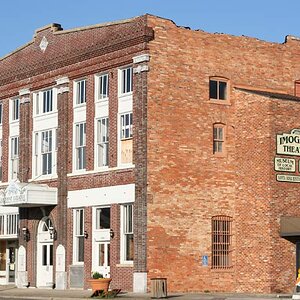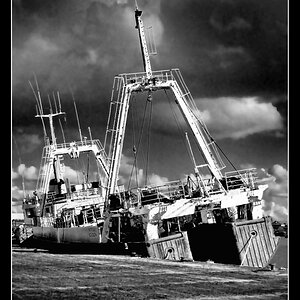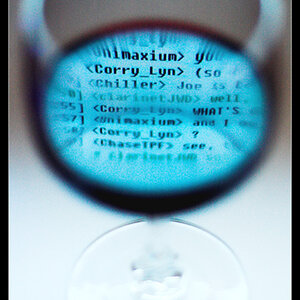Just a little venting here, and also a few questions to ponder. Sorry it's long I'm pretty ticked off right now. So if you want to skip to the bottom and answer the questions that would be just grand 
So I just came back from having advisement. Up until now I've had an advisor for my communications major, but now I'm finished with that so they moved me off to the art department. My new advisor is a complete moron, not meaning any disrepect but he's awful. A teacher at our college that has been there forever is retiring and he was the professor for all the photography classes. Our school is having trouble finding a new photography teacher (partially b/c they have to teach lots of other stuff as well with crappy pay). Anyway my new advisor who teaches all the graphic design stuff tried to tell me that I couldn't take a photography class b/c he wasn't sure about the new teacher. I told him I had to have it to graduate next year so he put me in it anyway. Then he proceeds to tell me that I should just change my major to graphic design...he said I would do more photography in that anyway (yah right, he himself says he knows squatt about photography).
Now this is where I get really mad, and the question comes in:
He told me that the new teacher may get rid of the color darkroom, and I said good b/c I think we should learn things digitially anyway. Currently there is only one class for digital and the rest is darkroom. Secondly our equipment in the color darkroom is breaking and according to the teacher there is no one to fix it. So I go on to tell the teacher I think that we should do more digital stuff and that's when he went ape on me. I said when I go out to get a job doing photography next year, maybe doing some kind of photojournalism do you honestly think they're going to have me shoot film, bring it back, and develop it in a colored darkroom??? I said you know they are going to have me use photoshop to edit my photos and shoot digital b/c people just don't do that anymore for the most part. He really let me have it after that one saying I didn't know what I was talking about and that I had a narrow minded viewpoint. I understand that it is good to learn the basic darkroom b/c that will help with digital, and that it's good to learn on a film camera before digital as well IMO. But to me it seems that taking 1 class to learn both is sufficient and that we should be able to take classes that will actually help us with our future plans.
So the question for you all is this. Do you think at the university level students should be required to learn both black and white and colored darkrooms before being able to do digital?
Second, do you think that photography students should be required to take painting, sculpture, life drawing and classes such as this?
Third and last question, In your experience do you think that it is necessary to learn the colored darkroom process????
So I just came back from having advisement. Up until now I've had an advisor for my communications major, but now I'm finished with that so they moved me off to the art department. My new advisor is a complete moron, not meaning any disrepect but he's awful. A teacher at our college that has been there forever is retiring and he was the professor for all the photography classes. Our school is having trouble finding a new photography teacher (partially b/c they have to teach lots of other stuff as well with crappy pay). Anyway my new advisor who teaches all the graphic design stuff tried to tell me that I couldn't take a photography class b/c he wasn't sure about the new teacher. I told him I had to have it to graduate next year so he put me in it anyway. Then he proceeds to tell me that I should just change my major to graphic design...he said I would do more photography in that anyway (yah right, he himself says he knows squatt about photography).
Now this is where I get really mad, and the question comes in:
He told me that the new teacher may get rid of the color darkroom, and I said good b/c I think we should learn things digitially anyway. Currently there is only one class for digital and the rest is darkroom. Secondly our equipment in the color darkroom is breaking and according to the teacher there is no one to fix it. So I go on to tell the teacher I think that we should do more digital stuff and that's when he went ape on me. I said when I go out to get a job doing photography next year, maybe doing some kind of photojournalism do you honestly think they're going to have me shoot film, bring it back, and develop it in a colored darkroom??? I said you know they are going to have me use photoshop to edit my photos and shoot digital b/c people just don't do that anymore for the most part. He really let me have it after that one saying I didn't know what I was talking about and that I had a narrow minded viewpoint. I understand that it is good to learn the basic darkroom b/c that will help with digital, and that it's good to learn on a film camera before digital as well IMO. But to me it seems that taking 1 class to learn both is sufficient and that we should be able to take classes that will actually help us with our future plans.
So the question for you all is this. Do you think at the university level students should be required to learn both black and white and colored darkrooms before being able to do digital?
Second, do you think that photography students should be required to take painting, sculpture, life drawing and classes such as this?
Third and last question, In your experience do you think that it is necessary to learn the colored darkroom process????









![[No title]](/data/xfmg/thumbnail/34/34123-da7d55491fec06595061191321c92646.jpg?1619736293)




![[No title]](/data/xfmg/thumbnail/34/34120-9085bc65df236ba03977d33a60b852d3.jpg?1619736290)